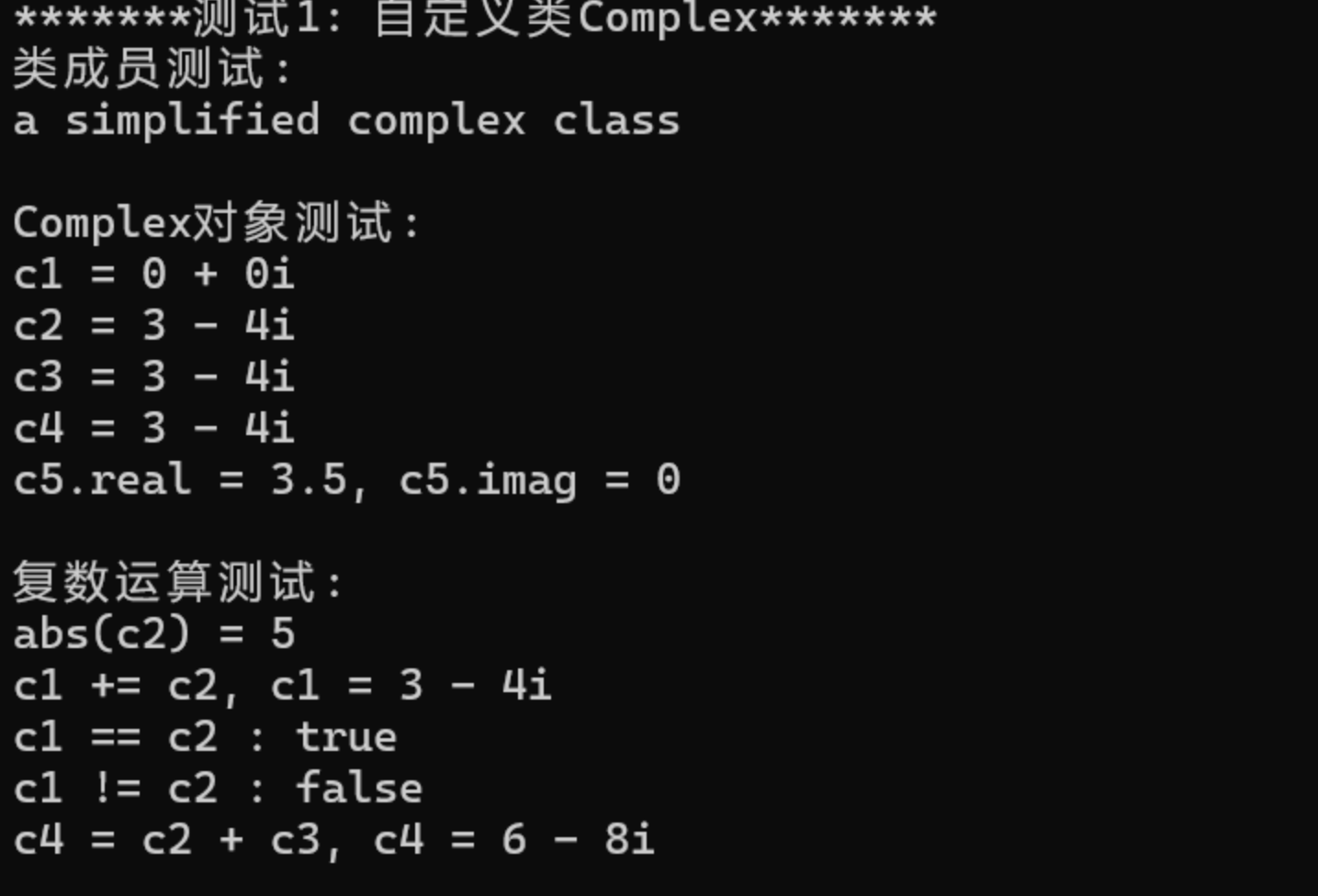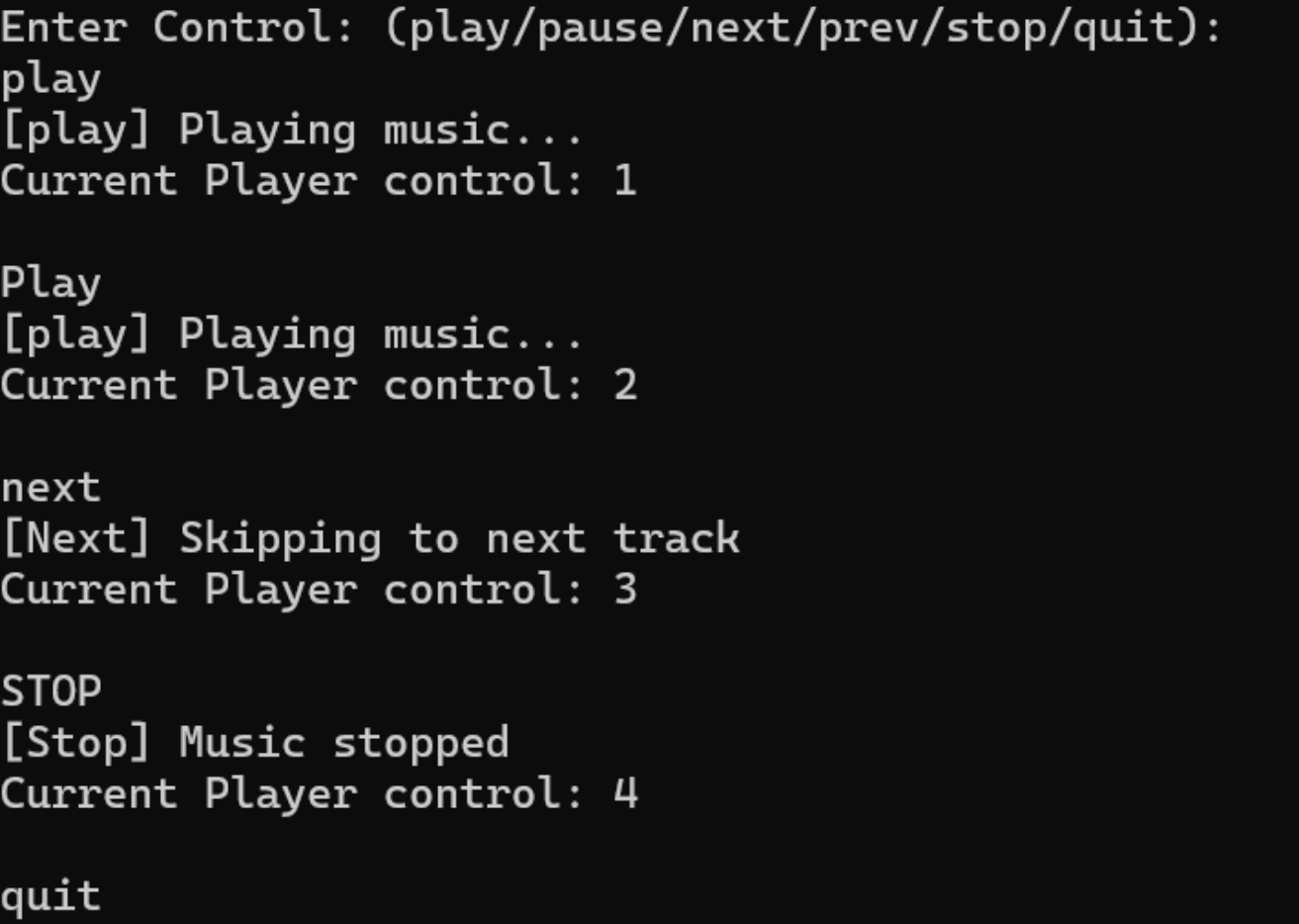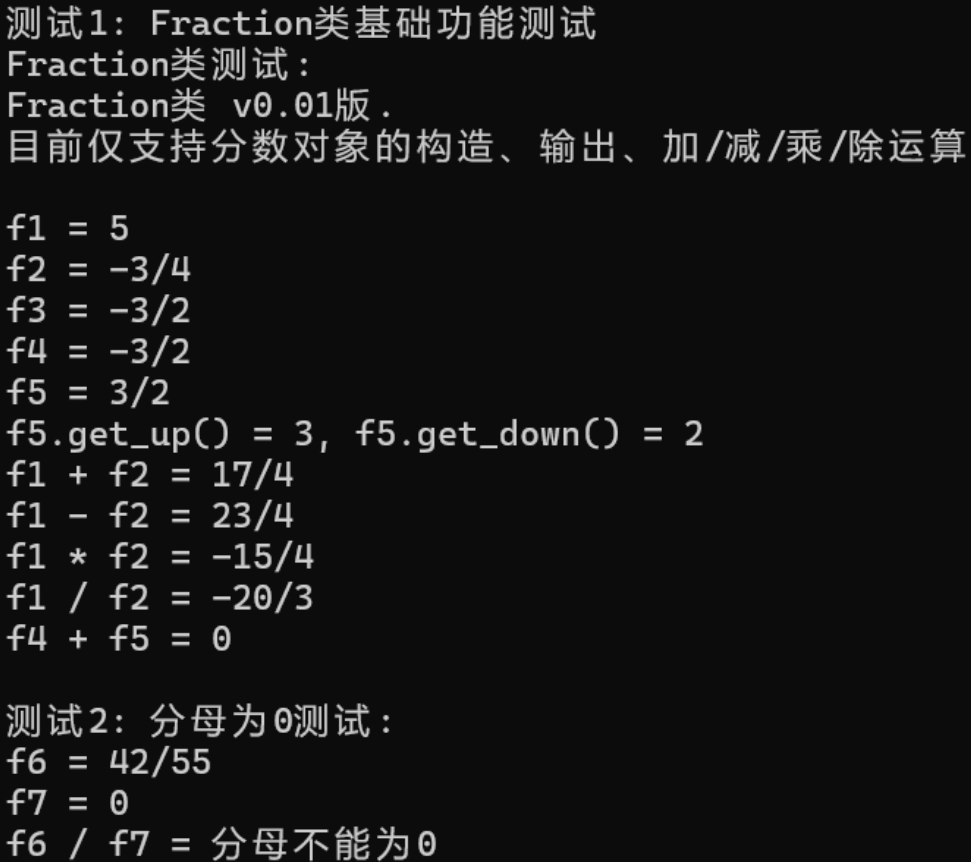实验二
#任务1
##代码
###T.h

#pragma once #include <string> // 类T: 声明 class T { // 对象属性、方法 public: T(int x = 0, int y = 0); // 普通构造函数 T(const T &t); // 复制构造函数 T(T &&t); // 移动构造函数 ~T(); // 析构函数 void adjust(int ratio); // 按系数成倍调整数据 void display() const; // 以(m1, m2)形式显示T类对象信息 private: int m1, m2; // 类属性、方法 public: static int get_cnt(); // 显示当前T类对象总数 public: static const std::string doc; // 类T的描述信息 static const int max_cnt; // 类T对象上限 private: static int cnt; // 当前T类对象数目 // 类T友元函数声明 friend void func(); }; // 普通函数声明 void func();
###T.cpp

#include "T.h" #include <iostream> #include <string> // 类T实现 // static成员数据类外初始化 const std::string T::doc{"a simple class sample"}; const int T::max_cnt = 999; int T::cnt = 0; // 类方法 int T::get_cnt() { return cnt; } // 对象方法 T::T(int x, int y): m1{x}, m2{y} { ++cnt; std::cout << "T constructor called.\n"; } T::T(const T &t): m1{t.m1}, m2{t.m2} { ++cnt; std::cout << "T copy constructor called.\n"; } T::T(T &&t): m1{t.m1}, m2{t.m2} { ++cnt; std::cout << "T move constructor called.\n"; } T::~T() { --cnt; std::cout << "T destructor called.\n"; } void T::adjust(int ratio) { m1 *= ratio; m2 *= ratio; } void T::display() const { std::cout << "(" << m1 << ", " << m2 << ")" ; } // 普通函数实现 void func() { T t5(42); t5.m2 = 2049; std::cout << "t5 = "; t5.display(); std::cout << '\n'; }
###Task.cpp

#include "T.h" #include <iostream> void test_T(); int main() { std::cout << "test Class T: \n"; test_T(); std::cout << "\ntest friend func: \n"; func(); } void test_T() { using std::cout; using std::endl; cout << "T info: " << T::doc << endl; cout << "T objects'max count: " << T::max_cnt << endl; cout << "T objects'current count: " << T::get_cnt() << endl << endl; T t1; cout << "t1 = "; t1.display(); cout << endl; T t2(3, 4); cout << "t2 = "; t2.display(); cout << endl; T t3(t2); t3.adjust(2); cout << "t3 = "; t3.display(); cout << endl; T t4(std::move(t2)); cout << "t4 = "; t4.display(); cout << endl; cout << "test: T objects'current count: " << T::get_cnt() << endl; }
##运行测试截图

##问题回答
###问题1 YES
###问题2 普通构造函数T(int x = 0, int y = 0)
功能:使用给定的 x 和 y 初始化 m1 和 m2 成员。如果调用时没有提供参数,则使用默认值 (0, 0)
调用时机:
复制构造函数 T(const T &t)
功能:用另一个同类型对象 t 的成员值来初始化新对象的成员
调用时机:用一个已有对象初始化新对象时或函数按值传参
移动构造函数 T(T &&t)
功能:从临时对象(右值)t 中“窃取”资源
调用时机:用临时对象(右值)初始化新对象函数或返回局部对象
析构函数 ~T()
功能:清理对象的资源
调用时机:当对象离开其作用域,通过delete操作释放动态分配的对象时被调用
###问题3 能
#任务2
##代码
Complex.h

#pragma once #include <string> class Complex { public: static const std::string doc; Complex(double real = 0.0, double imag = 0.0); Complex(const Complex& other); double get_real() const; double get_imag() const; void add(const Complex& other); friend void output(const Complex& c); friend double abs(const Complex& c); friend Complex add(const Complex& c1, const Complex& c2); friend bool is_equal(const Complex& c1, const Complex& c2); friend bool is_not_equal(const Complex& c1, const Complex& c2); private: double real; double imag; };
Complex.cpp

#include "Complex.h" #include <cmath> #include <iostream> // 类属性初始化 const std::string Complex::doc = "a simplified Complex class"; // 构造函数实现 Complex::Complex(double real, double imag) : real(real), imag(imag) {} Complex::Complex(const Complex& other) : real(other.real), imag(other.imag) {} // 对象方法实现 double Complex::get_real() const { return real; } double Complex::get_imag() const { return imag; } void Complex::add(const Complex& other) { real += other.real; imag += other.imag; } // 友元函数实现 void output(const Complex& c) { std::cout << c.real; if (c.imag >= 0) std::cout << " + " << c.imag << "i"; else std::cout << " - " << -c.imag << "i"; } double abs(const Complex& c) { return std::sqrt(c.real * c.real + c.imag * c.imag); } Complex add(const Complex& c1, const Complex& c2) { return Complex(c1.real + c2.real, c1.imag + c2.imag); } bool is_equal(const Complex& c1, const Complex& c2) { return (c1.real == c2.real) && (c1.imag == c2.imag); } bool is_not_equal(const Complex& c1, const Complex& c2) { return !is_equal(c1, c2); }
task2.cpp

#include <iostream> #include <iomanip> #include <complex> void test_Complex(); void test_std_complex(); int main() { std::cout << "*******测试1: 自定义类Complex*******\n"; test_Complex(); std::cout << "\n*******测试2: 标准库模板类*******\n"; test_std_complex(); } void test_Complex() { using std::cout; using std::endl; using std::boolalpha; cout << "类成员测试: " << endl; cout << Complex::doc << endl << endl; cout << "Complex对象测试: " << endl; Complex c1; Complex c2(3, -4); Complex c3(c2); Complex c4 = c2; const Complex c5(3.5); cout << "c1 = "; output(c1); cout << endl; cout << "c2 = "; output(c2); cout << endl; cout << "c3 = "; output(c3); cout << endl; cout << "c4 = "; output(c4); cout << endl; cout << "c5.real = " << c5.get_real() << ", c5.imag = " << c5.get_imag() << endl << endl; cout << "复数运算测试:" << endl; cout << "abs(c2) = " << abs(c2) << endl; c1.add(c2); cout << "c1 += c2, c1 = "; output(c1); cout << endl; cout << boolalpha; cout << "c1 == c2 : " << is_equal(c1, c2) << endl; cout << "c1 != c2 : " << is_not_equal(c1, c2) << endl; c4 = add(c2, c3); cout << "c4 = c2 + c3, c4 = "; output(c4); cout << endl; } void test_std_complex() { using std::cout; using std::endl; using std::boolalpha; cout << "std::complex<double>对象测试: " << endl; std::complex<double> c1; std::complex<double> c2(3, -4); std::complex<double> c3(c2); std::complex<double> c4 = c2; const std::complex<double> c5(3.5); cout << "c1 = " << c1 << endl; cout << "c2 = " << c2 << endl; cout << "c3 = " << c3 << endl; cout << "c4 = " << c4 << endl; cout << "c5.real = " << c5.real() << ", c5.imag = " << c5.imag() << endl << endl; cout << "复数运算测试: " << endl; cout << "abs(c2) = " << abs(c2) << endl; c1 += c2; cout << "c1 += c2, c1 = " << c1 << endl; cout << boolalpha; cout << "c1 == c2 : " << (c1 == c2)<< endl; cout << "c1 != c2 : " << (c1 != c2) << endl; c4 = c2 + c3; cout << "c4 = c2 + c3, c4 = " << c4 << endl; }
##运行测试截图


##问题回答
###问题1 标准库模板类complex更简洁;有关联
###问题2
2.1 是,可以通过设置为friend实现
2.2 是
2.3需要直接访问类的私有成员
###问题3 将拷贝赋值运算符设为私有
#任务3
##代码
PlayerControl.h

#pragma once #include <string> enum class ControlType {Play, Pause, Next, Prev, Stop, Unknown}; class PlayerControl { public: PlayerControl(); ControlType parse(const std::string& control_str); // 实现std::string --> ControlType转换ControlTypeת�� void execute(ControlType cmd) const; // 执行控制操作(以打印输出模拟) static int get_cnt(); private: static int total_cnt; };
PlayerControl.cpp

#include "PlayerControl.h" #include <iostream> #include <algorithm> int PlayerControl::total_cnt = 0; PlayerControl::PlayerControl() {} // 待补足 // 1. 将输入字符串转为小写,实现大小写不敏感 // 2. 匹配"play"/"pause"/"next"/"prev"/"stop"并返回对应枚举 // 3. 未匹配的字符串返回ControlType::Unknown // 4. 每次成功调用parse时递增total_cnt ControlType PlayerControl::parse(const std::string& control_str) { std::string lower_str = control_str; std::transform(lower_str.begin(),lower_str.end(),lower_str.begin(),::tolower); total_cnt++; if (lower_str == "play") return ControlType::Play; else if (lower_str == "pause") return ControlType::Pause; else if (lower_str == "next") return ControlType::Next; else if (lower_str == "prev") return ControlType::Prev; else if (lower_str == "stop") return ControlType::Stop; else return ControlType::Unknown; } void PlayerControl::execute(ControlType cmd) const { switch (cmd) { case ControlType::Play: std::cout << "[play] Playing music...\n"; break; case ControlType::Pause: std::cout << "[Pause] Music paused\n"; break; case ControlType::Next: std::cout << "[Next] Skipping to next track\n"; break; case ControlType::Prev: std::cout << "[Prev] Back to previous track\n"; break; case ControlType::Stop: std::cout << "[Stop] Music stopped\n"; break; default: std::cout << "[Error] unknown control\n"; break; } } int PlayerControl::get_cnt() { return total_cnt; }
task3.cpp

#include "PlayerControl.h" #include <iostream> void test() { PlayerControl controller; std::string control_str; std::cout << "Enter Control: (play/pause/next/prev/stop/quit):\n"; while(std::cin >> control_str) { if(control_str == "quit") break; ControlType cmd = controller.parse(control_str); controller.execute(cmd); std::cout << "Current Player control: " << PlayerControl::get_cnt() << "\n\n"; } } int main() { test(); }
##运行测试截图

#任务4
##代码
Fraction.h

#pragma once #include <string> class Fraction { public: Fraction(int up = 0, int down = 1); Fraction(const Fraction& f); int get_up() const; int get_down() const; Fraction negative() const; static const std::string doc; private: int up, down; void simplify(); friend void output(const Fraction& f); friend Fraction add(const Fraction& a, const Fraction& b); friend Fraction sub(const Fraction& a, const Fraction& b); friend Fraction mul(const Fraction& a, const Fraction& b); friend Fraction div(const Fraction& a, const Fraction& b); };
Fraction.cpp

#include "Fraction.h" #include <iostream> #include <numeric> #include <stdexcept> const std::string Fraction::doc = "Fraction类 v0.01版"; Fraction::Fraction(int u, int d): up{u}, down{d} { if (down == 0) throw std::invalid_argument("Denominator cannot be zero"); simplify(); } Fraction::Fraction(const Fraction& f): up{f.up}, down{f.down} {} void Fraction::simplify() { if (down < 0) { down = -down; up = -up; } int g = std::gcd(up, down); if (g != 0) { up /= g; down /= g; } } int Fraction::get_up() const { return up; } int Fraction::get_down() const { return down; } Fraction Fraction::negative() const { return Fraction(-up, down); } void output(const Fraction& f) { std::cout << f.up << "/" << f.down; } Fraction add(const Fraction& a, const Fraction& b) { return Fraction(a.up * b.down + b.up * a.down, a.down * b.down); } Fraction sub(const Fraction& a, const Fraction& b) { return Fraction(a.up * b.down - b.up * a.down, a.down * b.down); } Fraction mul(const Fraction& a, const Fraction& b) { return Fraction(a.up * b.up, a.down * b.down); } Fraction div(const Fraction& a, const Fraction& b) { if (b.up == 0) throw std::invalid_argument("Division by zero"); return Fraction(a.up * b.down, a.down * b.up); }
task4.cpp

#include "Fraction.h" #include <iostream> void test1(); void test2(); int main() { std::cout << "测试1: Fraction类基础功能测试\n"; test1(); std::cout <<"\n测试2: 分母为0测试: \n"; test2(); } void test1() { using std::cout; using std::endl; cout << "Fraction类测试: " << endl; cout << Fraction::doc << endl << endl; Fraction f1(5); Fraction f2(3, -4), f3(-18, 12); Fraction f4(f3); cout << "f1 = "; output(f1); cout << endl; cout << "f2 = "; output(f2); cout << endl; cout << "f3 = "; output(f3); cout << endl; cout << "f4 = "; output(f4); cout << endl; const Fraction f5(f4.negative()); cout << "f5 = "; output(f5); cout << endl; cout << "f5.get_up() = " << f5.get_up() << ", f5.get_down() = " << f5.get_down() << endl; cout << "f1 + f2 = "; output(add(f1, f2)); cout << endl; cout << "f1 - f2 = "; output(sub(f1, f2)); cout << endl; cout << "f1 * f2 = "; output(mul(f1, f2)); cout << endl; cout << "f1 / f2 = "; output(div(f1, f2)); cout << endl; cout << "f4 + f5 = "; output(add(f4, f5)); cout << endl; } void test2() { using std::cout; using std::endl; Fraction f6(42, 55), f7(0, 3); cout << "f6 = "; output(f6); cout << endl; cout << "f7 = "; output(f7); cout << endl; cout << "f6 / f7 = "; output(div(f6, f7)); cout << endl; }
##运行测试截图

##问题回答
友元,友元函数可以访问类的私有成员,可以实现复杂的运算逻辑





 浙公网安备 33010602011771号
浙公网安备 33010602011771号